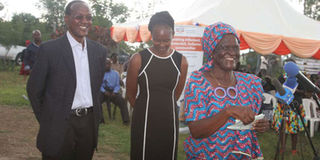Legacy of charity that Christabel Ouko moulded

Christabel Ouko and her children during the opening of Dr. Robert Ouko Memorial Library in 2014. PHOTO | FILE | NATION MEDIA GROUP
What you need to know:
- Until her death in a road accident early this week, Mrs Ouko had taken to a quiet yet productive life in Koru, Kisumu County, engaging in social work, community empowerment and farming.
- In her words, Dr Robert Ouko Memorial Community Library is a living tribute to her husband, who had a fascinating love for books.
- During the 1979 elections, Dr Ouko joined competitive politics, contested the Kisumu Rural seat and easily won, repeating the feat in 1983.
The death of Christabel Ouko, the widow of slain Foreign Affairs Minister Robert Ouko, marks a tragic end to the matriarch of a family that has endured pain, anger and anguish.
Until her death in a road accident early this week, Mrs Ouko had taken to a quiet yet productive life in Koru, Kisumu County, engaging in social work, community empowerment and farming.
Her enduring legacy is the community library she put up on the family land in Koru and which, over time, has become a hub for cultural and educational activities.
In her words, Dr Robert Ouko Memorial Community Library is a living tribute to her husband, who had a fascinating love for books.
Besides the library, Mrs Ouko actively supported education programmes, including putting up the Dr Ouko Primary School, a centre of excellence in Muhoroni.
ACADEMIC JOURNEY
Dr Ouko was a self-made man who left school after primary level but was later to embark on an academic journey that saw him study privately and climb the ladder, ultimately joining the then Haile Selassie University (now University of Addis Ababa) in Ethiopia and later Makerere University in Uganda.
He joined public service at the dawn of independence and rose to become a permanent secretary and later a minister at the then East African Community (EAC), which collapsed in 1977.
Dr Ouko returned home from Arusha, headquarters of EAC, and was nominated to Parliament and appointed to the Cabinet by President Daniel arap Moi.
During the 1979 elections, Dr Ouko joined competitive politics, contested the Kisumu Rural seat and easily won, repeating the feat in 1983.
However, following realignment of electoral boundaries, he shifted base to Kisumu Town in 1988, which he represented until his death in February 1990.
BITTER MEMORIES
Mrs Ouko’s death, therefore, evokes bitter memories of the brutal and macabre assassination of her husband, arguably one of the most ebullient, honest and straight-thinking ministers and politicians in Kenya. Dr Ouko’s death remains a mystery, nearly three decades later, just like that of Pio Gama Pinto (1965), Tom Mboya (1969) and JM Kariuki (1975) — all before him.
Thrust into the limelight after her husband’s brutal murder, Mrs Ouko endured grief and torment with calmness. She was maligned and pushed to the wall, but remained steadfast.
Several things happened after Dr Ouko’s death. First, the government invited Scotland Yard from UK to investigate the death of the popular politician.
The investigators did their work and compiled a report but whose content was never made public. It was only later that the lead detective, John Troon, would reveal in an interview with the New York Times that Dr Ouko was killed because he stood against high-level corruption in government.
All hands pointed to powerful people in the Moi-government, among them Nicholas Biwott, recently deceased, and former permanent secretary for Internal Security Hezekiah Oyugi, who died in 1992 from a mysterious ailment.
INVESTIGATE DEATH
Second, President Moi set up a Commission of Inquiry to investigate the death. It was headed by Justice Evan Gicheru, who was to become Chief Justice in 2003 in the Mwai Kibaki Narc administration. Significant to note, both the investigations and the inquiry were cut short, clearly signalling a State-orchestrated cover-up.
Indeed, many people who either worked for the Ouko family or were involved in the investigations or trial died in mysterious circumstances.
Among them was High Court Judge Fidahussein Abdullah, the trial judge in the Ouko death case, and Mr Oyugi, who had been mentioned adversely by investigators.
Retired Police Commissioner Philip Kilonzo, who was at the centre of the murder investigation, also died mysteriously in 1997 as he took a drink at his pub in Matuu, Machakos County.
MURDER
One of the key suspects in the murder, then Nakuru DC Jonah Anguka, had to escape to the US.
Mrs Ouko stood firm and dignified amid all this — keeping the family ship steady by guiding the children and protecting them from publicity or external aggressors, including political opportunists.
She lived for 27 years after the death of her husband without ruffling feathers. Mrs Ouko kept off politics, a path many in her shoes would have contemplated.
Even so, Dr Ouko’s death was not in vain. It was among events that precipitated the demise of the single party rule and stirred the quest for real political reforms.




